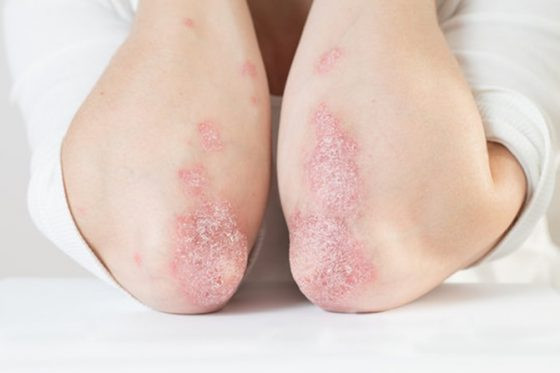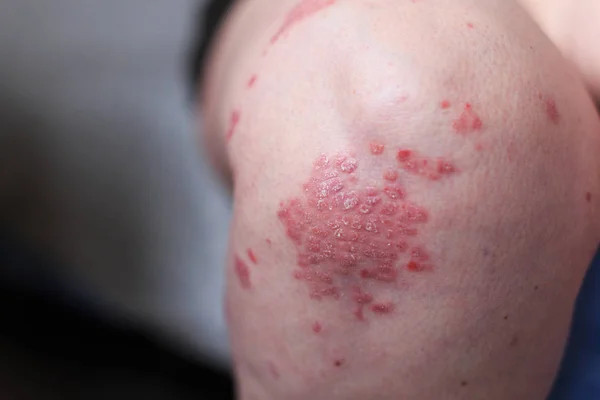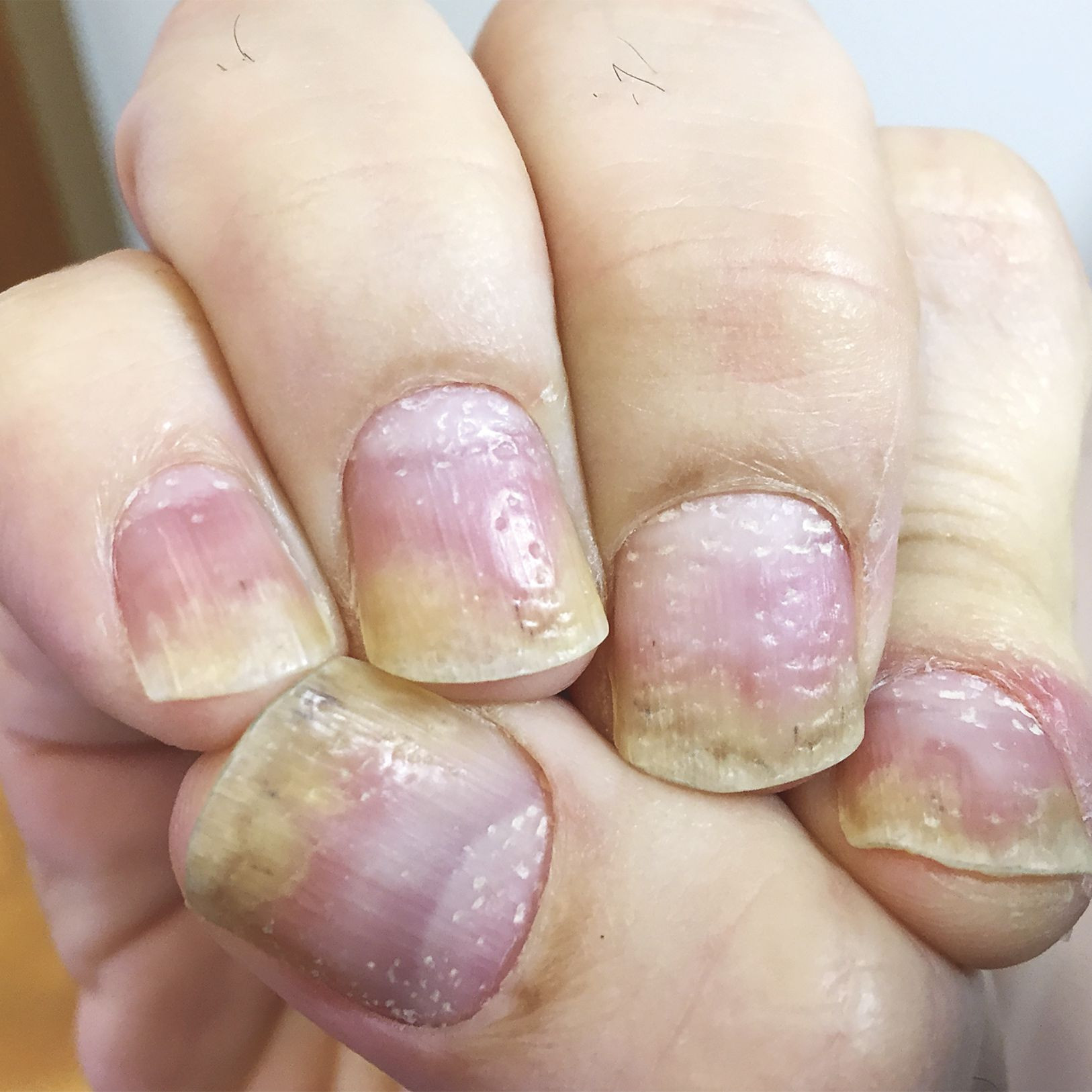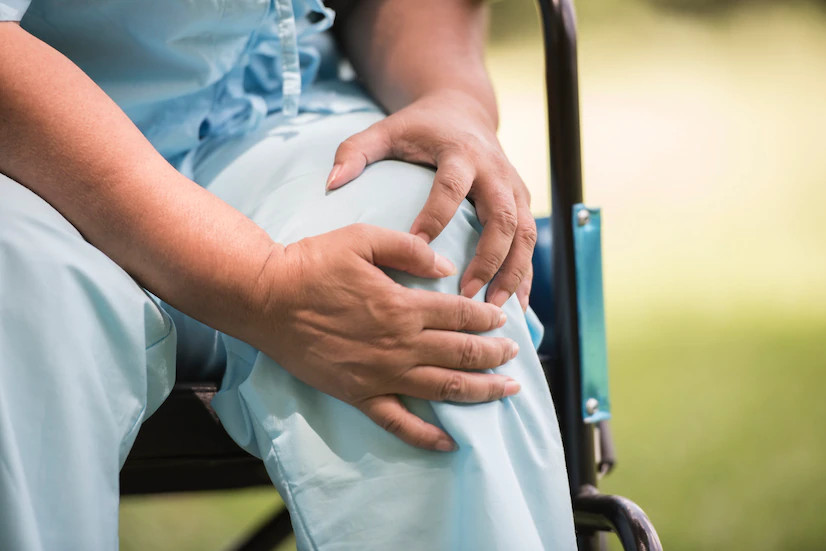Definisi
Psoriasis merupakan penyakit radang kulit yang bersifat kronis atau jangka panjang, menyebabkan kulit menjadi berwarna kemerahan, bersisik tebal, dan sering terasa gatal. Sisik tebal diakibatkan oleh peningkatan regenerasi siklus sel kulit sebanyak lebih dari 10 kali lipat lebih cepat dibandingkan siklus normal. Psoriasis dapat ditemukan di bagian tubuh mana saja, namun lebih sering ditemukan di area lutut, siku, badan, atau kulit kepala. Psoriasis bukanlah penyakit yang menular dari orang ke orang. Meskipun demikian, keturunan secara genetik memungkinkan seseorang mengalami psoriasis dari riwayat penyakit keluarga yang sama.
Hingga saat ini belum ada pengobatan psoriasis yang membuat seorang pengidap menjadi sembuh total, hanya dapat dikatakan mengalami remisi. Kecenderungan akan muncul kembali apabila dipicu oleh beberapa faktor tertentu. Terapi yang ada saat ini berperan untuk membantu mengelola gejala yang dirasakan oleh pengidap. Oleh karena itu, pengidap psoriasis perlu bersahabat dengan penyakit ini dan memulai gaya hidup sehat yang lebih baik sehingga kualitas hidup dapat menjadi lebih baik.
Psoriasis bukanlah penyakit yang menyerang pada kulit saja, melainkan dapat juga menyerang pada beberapa organ, termasuk mata dan sendi. Oleh karena itu, perlu dikenali apakah sudah ada gejala-gejala tertentu pada mata atau sendi pada seseorang dengan psoriasis.
Psoriasis terjadi di seluruh dunia dan memiliki angka kejadian yang beragam berkisar 0,2% - 4.8%. Sekitar 2% warga di Amerika Serikat mengalami psoriasis. Angka kejadian di Jepang termasuk rendah, bahkan hampr tidak ada di suku Aboriginal Australian dan Indian dari Amerika Selatan. Psoriasis dapat terjadi di rentang usia mana pun. Psoriasis dapat timbul pertama kali dari usia 15 – 20 tahun dan 55 – 60 tahun.
Penyebab
Penyebab pasti dari psoriasis tidak diketahui sepenuhnya. Namun, diduga bahwa disebabkan oleh penyakit autoimun yang diperantarai oleh sel imun jenis limfosit T. Sistem imun yang bermasalah ini menyebabkan kulit mengalami regenerasi yang lebih cepat dibandingkan siklus normal sehingga terjadi penumpukan sel kulit. Masalah system imun ini hingga saat ini belum dipahami secara menyeluruh namun diduga faktor genetik dan faktor lingkungan memiliki peran penting dalam munculnya psoriasis.
Faktor Risiko
Pengenalan mengenai faktor-faktor risiko sangat berperan penting dalam pencegahan hingga pengobatan psoriasis. Semua orang dapat saja berisiko mengalami psoriasis, namun ada beberapa faktor risiko yang lebih menentukan apakah anda akan mengalami psoriasis atau tidak di masa depan.
Faktor-faktor risiko dapat dibagi menjadi faktor risiko yang tidak dapat diperbaiki seperti memiliki riyawat keluarga yang mengalami psoriasis. Disebutkan bahwa memiliki salah satu orang tua dengan psoriasis akan meningkatkan risiko kejadian psoriasis pada anak yang lebih tinggi, sedangkan apabila kedua orang tua memiliki psoriasis, maka risiko psoriasis muncul pada anak jauh lebih tinggi kejadianya.
Di sisi lain, faktor risiko yang dapat diperbaiki contohnya seperti stress dan merokok. Telah diketahui bahwa stress emosional dapat mempengaruhi kerja dari system pertahanan tubuh. Disebutkan bahwa kadar stress emosional yang tinggi dapat meningkatkan risiko Anda mengalami psoriasis. Selain itu, merokok tidak hanya meningkatkan risiko Anda mengalami psoriasis, melainkan juga dapat meningkatkan risiko keparahan dari kejadian psoriasis menjadi lebih berat dan sulit diterapi. Merokok juga dapat menjadi faktor yang berperan memuncukan perkembangan penyakit psoriasis. Oleh karean itu, Anda perlu mengelola stress emosional dan hindari bahkan hentikan merokok agar psoriasis tidak terjadi pada diri Anda. Selain itu, beberapa faktor lainnya seperti trauma, infeksi, udara dingin, alcohol, dan obat-obatan tertentu dapat menjadi faktor risiko juga.
Gejala
Gejala yang dapat dirasakan oleh penderita psoriasis dapat beragam, antara lain:
- tampak bercak merah tebal yang diatasnya terdapat sisik tebat berwarna perak,
- bercak kecil yang bersisik,
- kulit yang kering,
- terasa gatal,
- rasa seperti terbakar,
- kuku yang menebal,
- kuku yang ada celah kecil di lempeng kuku,
- hingga sendi-sendi yang bengkak dan kaku.
Diagnosis
Diagnosis psoriasis merupakan diagnosis klinis, artinya dokter dapat menetepkan diagnosis psoriasis melalui wawancara medis khusus dan pemeriksaan fisik pada umumnya. Diagnosis psoriasis harus dilakukan oleh dokter karena memerlukan penanganan yang khusus. Sebaiknya Anda beritahu dokter bila Anda atau seseorang di keluarga Anda pernah mengalami psoriasis sebelumnya. Informasi seperti kapan pertama kali gejala muncul juga akan membantu dokter mendiagnosis dan menentukan penanganan terbaik pada saat pasien pertama kali diperiksa oleh dokter.
Tata Laksana
Psoriasis memerlukan penanganan yang komprehensif. Hingga saat ini, sudah banyak pilihan tata laksana untuk menangani psoriasis. Dokter akan memilihkan tata laksana yang tepat pada pengidap psoriasis yang dilihat dari ukuran psoriasis, letak psoriasis, usia, dan status kesehatan secara umum.
Beberapa pilihan terapi diantaranya krim steroid, pelembap kulit, salep atau krim turunan vitamin D, atau krim retinoid. Terapi lainnya bisa berupa terapi sinar, obat minum tertentu, hingga terapi suntik biologik.
Komplikasi
Saat seseorang mengalami psoriasis, ada beberapa komplikasi penyakit yang berisiko tinggi timbul, di antaranya artritis psoriasis (penyakit radang sendi akibat psoriasis yang menimbulkan rasa nyeri, kaku, dan bengkak di area sekitar sendi), penyakit mata seperti konjungtivitis (penyakit radang pada lapisan mata depan), obesitas (kegemukan), diabetes melitus tipe 2, tekanan darah tinggi, penyakit jantung dan pembuluh darah, penyakit autoimun lainnya seperti Crohn disease (penyakit radang pada usus akibat autoimun), gangguan kejiwaan seperti depresi dan kepercayaan diri yang menurun.
Pencegahan
Berdasarkan penelitian hingga saat ini, tidak ada pendekatan spesifik mengenai pencegahan psoriasis. Meskipun demikian, pengenalan faktor risiko yang anda miliki merupakan salah satu langkah yang penting. Langkah berikutnya adalah perbaikan faktor risiko yang dapat diperbaiki. Berikut langkah-langkah yang dapat anda lakukan:
- Makan makanan sehat dapat membantu menurunkan risiko psoriasis dan membantu anda menurunkan berat badan bila diperlukan. Tingkatkan konsumsi buah-buahan dan sayur-sayuran dan makanan tinggi serat setiap hari. Kurangi asupan garam, lemak trans dan makanan yang sudah diproses. Pencegahan terjadinya obesitas dapat mempermudah remisi dalam tata laksana
- Bagi perokok, sebaiknya mulai berhenti merokok.
- Batasi minum minuman beralkohol bila perlu boleh untuk dihentikan dan digantikan dengan meminum air putih sebanyak 2 liter per hari atau 8 gelas per hari. Pembatasan minum alcohol dapat meningkatkan kesempatan untuk minimal mendapat remisi sementara dalam pengobatan.
- Mulai rutin berolahraga yang ringan terutama saat pagi hari atau malam hari saat minimal cahaya matahari seperti berlari ringan atau bersepeda, cukup 30 menit sehari, 5 hari per minggu. Bila Anda punya riwayat sakit tertentu, disarankan sebelumnya konsultasi dengan dokter Anda sebelum mulai berolahraga.
- Istirahat yang cukup, sekitar 6-8 jam setiap hari.
- Kelola stress emosional Anda
- Hindari obat-obatan yang dapat memicu timbulnya psoriasis, seperti ibuprofen
- Jangan lupa untuk mengikuti regimen obat Anda sesuai arahan dokter
Selain langkah-langkah diatas, apabila Anda tidak pernah memeriksakan diri ke dokter, sebaiknya lakukan pemeriksaan umum dan bila ditemukan kondisi atau penyakit dapat meningkatkan risiko Anda mengalami psoriasis, maka dapat dimulai pengobatan sedini mungkin sebelum kondisi semakin parah dan risiko meningkat.
Kapan Harus ke Dokter?
Jika Anda mengalami gejala yang menyerupai psoriasis dan menjadi lebih berat dan menyebar, membuat Anda merasa tidak nyaman dan timbul rasa nyeri terutama pada sendi, tidak ada perbaikan dengan terapi tertentu, maka sebaiknya Anda memeriksakan diri lebih lanjut ke dokter spesialis kulit dan kelamin (SpKK) atau spesialis dermatologi dan venerologyi (SpDV). Dokter akan melakukan wawancara medis, pemeriksaan fisik, hingga pemeriksaan penunjang tertentu untuk menetapkan diagnosis pasti dan tata laksana yang tepat.
Mau tahu informasi seputar penyakit lainnya? Cek di sini, ya!
- dr Anita Larasati Priyono
Mayo Clinic. Psoriasis. 2020 May. https://www.mayoclinic.org/diseases-conditions/psoriasis/symptoms-causes/syc-20355840
Web MD. Psoriasis. 2021 October. https://www.webmd.com/skin-problems-and-treatments/psoriasis/understanding-psoriasis-basics
Medscape. Psoriasis. 2021 March. https://emedicine.medscape.com/article/1943419-overview#a1
Nair PA, Badri T. Psoriasis. [Updated 2021 Aug 11]. In: StatPearls [Internet]. Treasure Island (FL): StatPearls Publishing; 2022 Jan-. Available from: https://www.ncbi.nlm.nih.gov/books/NBK448194/











